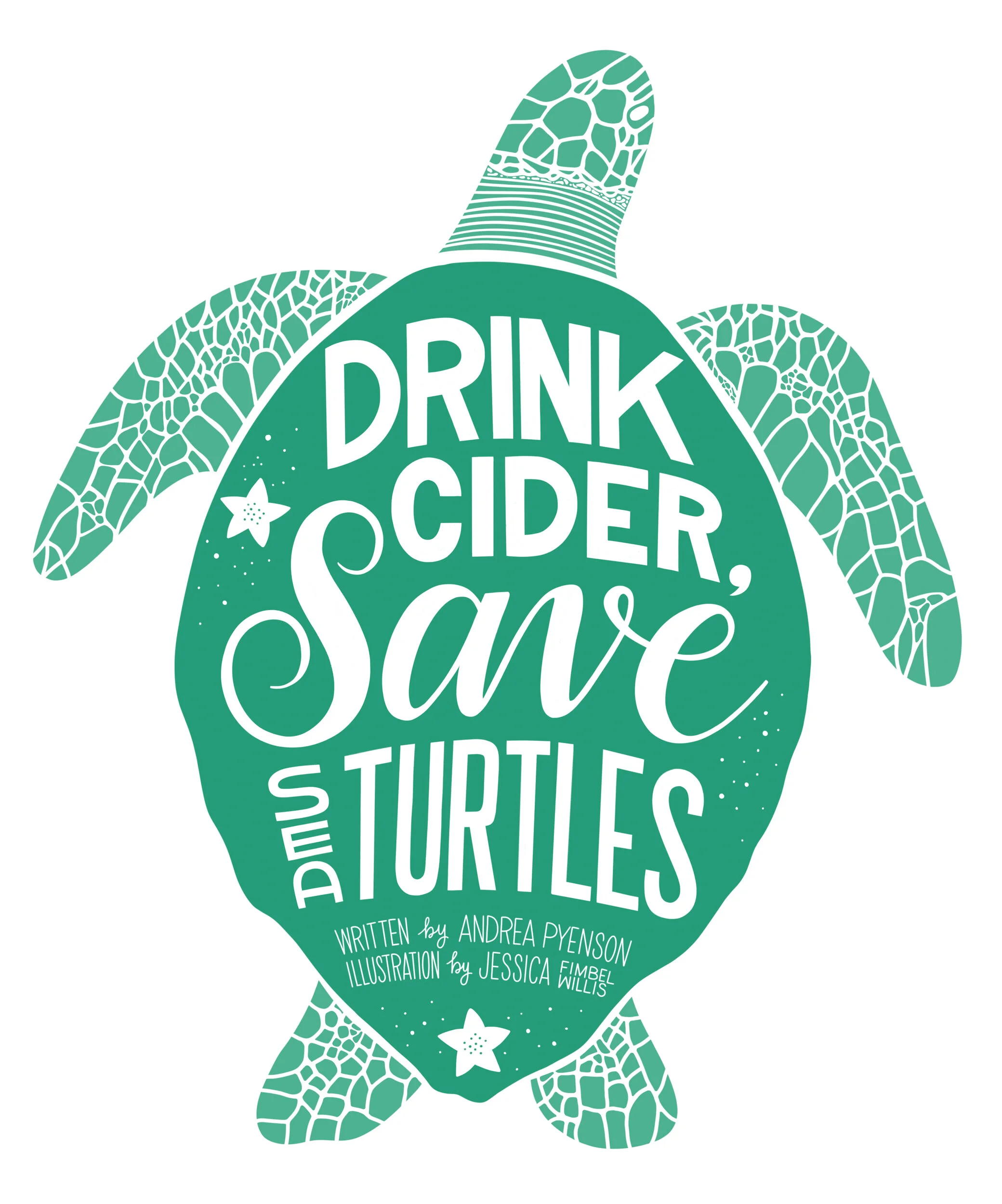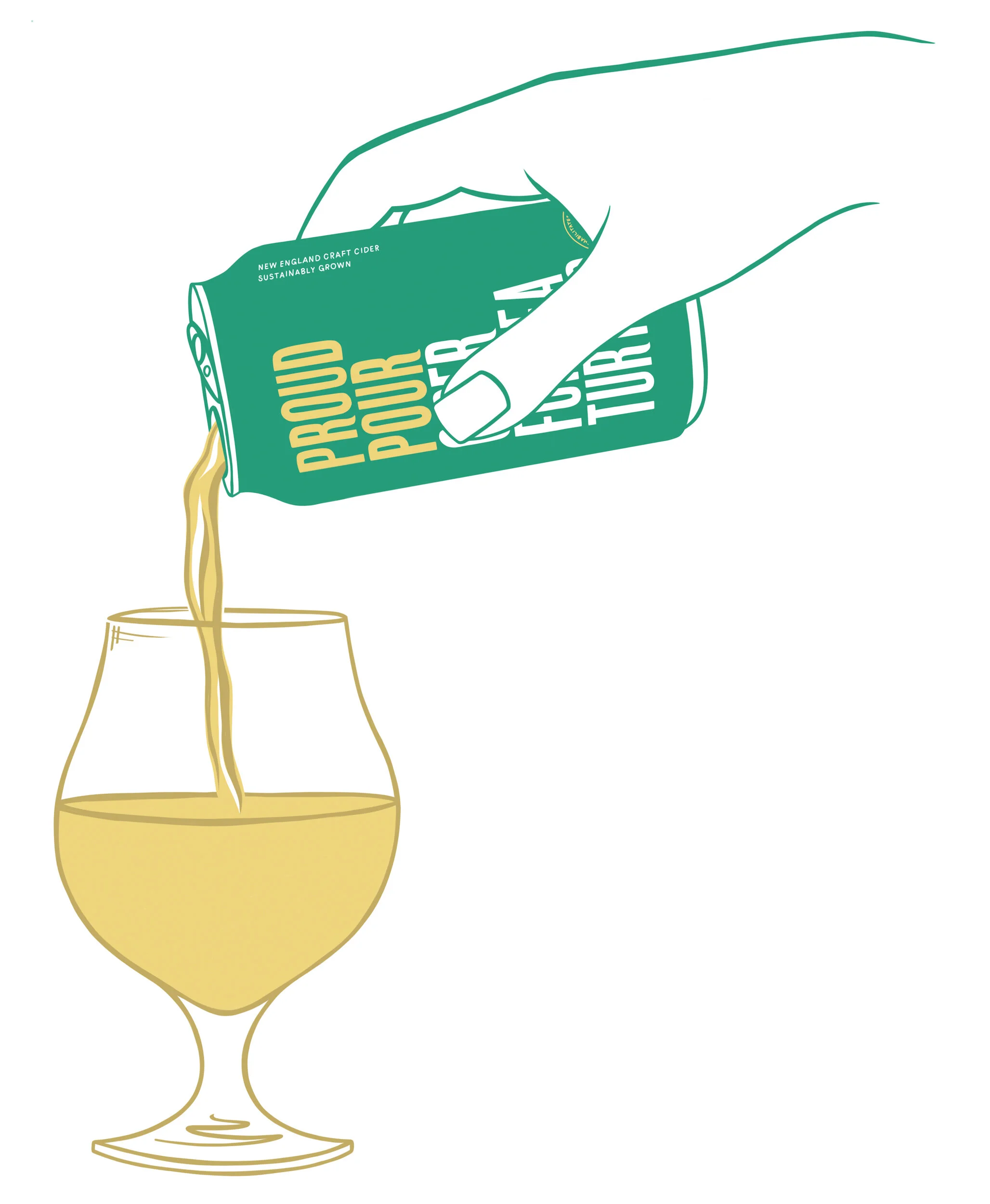Cider for Sea Turtles
Illustrations by Jessica Fimbel Willis
There’s a new craft cider in town. It’s crisp, dry and made from sustainably grown New England apples. With a mildly funky flavor reminiscent of some orange wines, it is a natural accompaniment to snacks, bar foods and many of the heartier dishes we’ll be enjoying as the temperatures drop. And unlike all the other craft ciders on the shelves, this one comes with a bonus. Created by Artifact Cider Project for Proud Pour, a mission-driven Boston-based beverage company, Cider for Sea Turtles is helping to protect injured sea turtles by donating funds to organizations dedicated to rehabilitating them and returning them to their natural environments.
Among the oldest creatures on earth, sea turtles have been around for more than 100 million years. But they are on the brink of extinction due to human activity by way of pollution, climate change, the loss of nesting habitat and turtles becoming entangled in fishing lines. Brian Thurber, Proud Pour CEO, was moved to action by their plight a few years ago when he attended a screening on Cape Cod of the documentary Saving Sea Turtles: Preventing Extinction. He met the New England Aquarium’s Connie Merigo at the event and spoke to her about supporting the Aquarium’s work. The sea turtle research program at the institution’s Anderson Cabot Center for Ocean Life is a global leader in the rescue and rehabilitation of sea turtles who become stranded on Cape Cod beaches. Merigo is senior biologist and Rescue Department manager.
Thurber’s business partner, Berlin Kelly, founded Proud Pour in New York in 2014 as a way to combine her passion for sustainable food and beverages with her concern for the environment. While living there, the California native learned about the worldwide decline of wild oyster reefs and an ongoing effort to restore the bivalves to New York Harbor. With a background in real estate and finance, she built a business whose first project was dedicated to supporting the oyster restoration effort. She worked with the Billion Oyster Project in New York and the Massachusetts Oyster Project to shape the vision for her company, forming partnerships with both organizations. Proud Pour sells beverages created by producers it selects and donates 13% of sales to environmental causes. Cider for Sea Turtles is its third beverage/project.
In early 2015 Kelly moved to Boston, bringing Proud Pour with her. She met Thurber, an attorney, shortly after she moved. He had come to Massachusetts a decade earlier to lead climate advocacy for an environmental nonprofit. Proud Pour’s first beverage was a Mendocino County (California) Sauvignon Blanc. When that project launched, Kelly said she chose Sauvignon Blanc because she wanted something that would pair well with oysters and that would appeal to a wide audience.
Through sales of its Sauvignon Blanc, the company has helped restore the habitats of 11 million oysters to date, working with 19 environmental nonprofit partners in 13 states (four in Massachusetts), each with its own local project. Proud Pour’s second product, a Willamette Valley (Oregon) Pinot Noir, was chosen to help restore bee habitat on farms across the United States. Using proceeds from sale of the wine the company makes regional donations to Xerces Society for Invertebrate Conservation. So, for example, Proud Pour Pinot Noir sold in New England supports bee habitat restoration on New England farms.
During the couple of years it took for the Cider for Sea Turtles project to come together, Thurber met more people from the aquarium. “We got to know them. They got to know us, and it seemed like a great thing to do,” he says. The company chose to create a cider to support the turtles, rather than sell another wine, because “cider is a super fun category,” he explains. “It’s growing in popularity.” And, he concedes, there’s a certain alliterative allure to the name. It is also the first of the company’s three products that is produced locally using local ingredients.
Thurber and Kelly launched a Kickstarter campaign in spring 2019 to fund their cider production. In April, with six hours to go, they exceeded their goal by just over $1,000. “People showed up for us … people we didn’t know, fans from around the country,” Thurber says.
While all species of sea turtles are currently threatened, most are considered endangered and Kemp’s ridley, the species most commonly found in local waters, are critically endangered. Every year in November and December, hundreds of turtles wash up on Cape Cod beaches, victims of cold stunning. (The term refers to the animals’ physiological reaction to prolonged exposure to cold-water temperatures.) The turtles’ instinct is to migrate south once the weather turns cold, but because of the Cape’s unique hook shape, many get stuck in the bay. There used to be around 60 to 100 strandings per year. In the last five to 10 years, according to Kara Dodge, a research scientist at the Anderson Center, the numbers have increased sharply. In 2014 more than 1,000 turtles washed up on beaches; in 2018, the number was between 700 and 800. “The turtles are very debilitated. They require heavy rehabilitation, which is expensive,” she says. Though not all survive, the Center’s record of success is impressive.
During the critical late fall/early winter period, hundreds of volunteers scour the Cape’s beaches for stranded turtles. Those that are still alive are airlifted to the rescue center in Quincy. Their symptoms range from decreased heart rate and circulation to shock and pneumonia. Some turtles are pretty banged up, too, with lacerations and other physical injuries if they have been caught up in fishing lines or other gear. Three full-time veterinarians (who are also responsible for the rest of the animals at the Aquarium) take care of the turtles, along with part-time veterinarians, one associate and rescue biologists. The program is intended as a conservation program, with a goal of reintegrating the turtles into the wild. Because they recuperate at different rates, the turtles are released at different times of year. If it is warm enough they can be released back into local waters. But if it is early spring, Center staff drives the turtles down south where the water is warmer. The Center follows the turtles after they are released to make sure they are doing well.
Because the strandings have increased so dramatically, Dodge notes, “Partnering with organizations like Proud Pour helps. The money may be used for medicine, paying for tags for post-release monitoring, paying interns. We are always looking to partner with like-minded organizations.”
Working with the Aquarium was a no-brainer for Proud Pour. As it turns out, the decision to turn to Artifact Cider Project was pretty easy for the company as well. Kelly met founder and head cider maker Soham Bhatt a few years ago at a festival where she was helping pour cider and, says Bhatt, “We connected about her vision for Proud Pour. We’re kind of shy about it but we’re environmentalists at heart.” A couple of years later Kelly introduced Bhatt to Thurber, and the two Cambridge residents became good friends. “We love what they do,” Thurber says.
“They are using wine to do a social good. We’re making cider for a new Northeast. I never thought to mash the two together until Brian approached me,” says Bhatt. Noting that Artifact’s ciders tend to be “quite progressive,” Bhatt explains that Thurber and Kelly asked him to develop a cider that would be approachable to a large customer base. “We developed something different than we were already making,” he says, describing a cider that is McIntosh-heavy with high-tannin bittersweets. “We fermented it out so it could retain some of its ‘apple-ness.’ I wanted to make sure I wasn’t imposing too much of Artifact into this cider. It’s significantly less sweet than a lot of what’s out there, with a lot of juiciness. But we also felt, if somebody’s going to drink this, they better drink something good.” Thurber describes the cider, which became available in mid-July, as “really nicely balanced; tends toward dry but not bone dry.”
“Working with a group like Proud Pour increases our exposure to people who drink cider who might not have known about the sea turtle danger,” says the Aquarium’s Dodge. “I think it’s super exciting. We’re trying to engage the next generation of scientists and environmentalists.”
At Fort Point Market in Boston an initial five-case Cider for Sea Turtles shipment “flew out,” according to manager Tony Rodriguez, and when we spoke in mid-August he was expecting his next shipment within days. “[Customers] liked the message behind it,” he says, adding that they also like the cider. “It’s not overly sweet.” Rodriguez says customers started asking for Cider for Sea Turtles before it ever arrived. It sold out within two weeks. By comparison, he explains, it usually takes at least two weeks to sell one case of cider.
Visit Proud Pour’s website (proudpour.com) to find where you can buy its newest offering. Then sit back, enjoy and help save the turtles.
This story appeared in the Fall 2019 issue.


